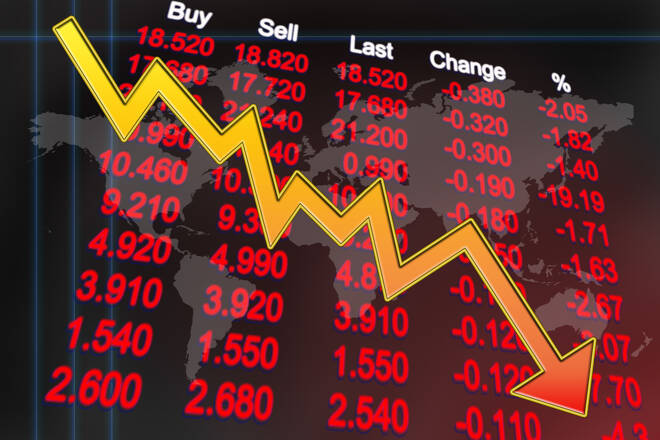Advertisement
Advertisement
Russian SWIFT Ban Drives Early ‘Risk-Off’ Mode
By:
The decision by Western allies to block certain Russian banks from the SWIFT payment system is likely to lift oil prices well above $100 a barrel.
Global investors are bracing Sunday for more wild swings in asset prices after Western nations announced a new stream of harsh sanctions designed to implement financial pain on Russia for its invasion of Ukraine. The punishing new sanctions include blocking some backs from the SWIFT international payments system.
Using Bitcoin as our early indicator, we expect to see riskier assets lower and safe-havens higher on Sunday’s opening. Crude oil, gold could gap higher on the opening.
US, Allies Target ‘Fortress Russia’ with New Sanctions including SWIFT Ban
The United States and its allies on Saturday moved to block certain banks’ access to the SWIFT international payment system in further punishment of Moscow as it continues its military assault against Ukraine, Reuters reported.
The measures, which will include restrictions on the Russian central bank’s international reserves, will be implemented in the coming days, the nations said in a joint statement that also vowed further action to come, according to Reuters.
“We will hold Russia to account and collectively ensure that this war is a strategic failure for Putin,” the leaders of the European Commission, France, Germany, Italy, Great Britain, Canada and the United States wrote.
“Even beyond the measures we are announcing today, we are prepared to take further measures to hold Russia to account for its attack on Ukraine.”
Global Investors Likely to Follow ‘The Book’
Professional investors revealed their hands last week when Russia’s invasion of Ukraine began last week. However, by the end of the week, conditions remained calm as traders assessed the impact of various sanctions on Russia by the international community.
Initially, professional traders followed “The Book.” They bought the traditional safe-havens: U.S. Treasurys, Japanese Yen, U.S. Dollar and Gold. And they sold riskier currencies and equities.
Speculators also bought crude oil, but that rally failed after President Biden said the original sanctions would not target Russian oil and gas. In fact, safe-havens fell and riskier assets rose at the end of the week because the international community did not block Russia’s access to SWIFT.
Conditions changed over the weekend with the blocking of Russia’s access to SWIFT, which means professional investors will once again follow “The Book”, which essentially means “buy safety, sell risk.”
This time, however, a surge in crude oil is expected to stick because Russia will not be able to use the SWIFT system to collect payments from its oil and gas sales. Basically, why should it continue to sell crude and natural gas if the country can’t get paid? This likely to cause a supply disruption.
Oil, Gold Prices Expected to Spike Higher
The decision by Western allies on Saturday to block certain Russian banks from the SWIFT payment system is likely to lift oil prices well above $100 a barrel as risks with trading Russian oil spike, Reuters reported.
Russian exports of all commodities from oil and metals to grains will be severely disrupted by the new Western sanctions, traders and analysts said.
At least 10 oil and commodities traders, who spoke to Reuters on condition of anonymity, said flows of Russian commodities to the West will be severely disrupted or halted for days if not weeks until clarity is established on exemptions.
Gold prices are also expected to rise, not only because of its safe-haven appeal, but because the Russian central bank is expected to resume gold purchases on its domestic market. I don’t expect the buying to stop there, however, since I am fairly certain they’ll be able to buy gold from some of the bigger world players if they want to, regardless of sanctions.
Since the rouble is tanking, the central bank wants to own all the gold it can. They want to control the supply and take it out of the hands of the people.
International Companies Face Exposure to Russia
While investors and speculators will likely drive crude, gold and other safe-havens higher, they’re also likely to dump shares of companies in Europe and the United States, who have exposure to Russia.
In Europe, the major companies with exposure to Russia include:
- BASF
- BP (British Petroleum)
- COCA-COLA HBC
- DANONE
- ENGIE
- EQUINOR
- GENERALI
- HEIDELBERGCEMENT
- MAIRE TECHNIMONT
- METRO
- NESTE
- NESTLE
- NOKIAN TYRES
- OMV
- RENAULT
- ROLLS-ROYCE
- SAFRAN
- SHELL
- TOTALENERGIES
- UNIPER
- VOLKSWAGEN
In Asia, the major companies with exposure to Russia include:
- JAPAN TOBACCO
- MARUBENI CORP
- MITSUBISHI CORP
- SBI HOLDINGS
- TOYOTA
In the United States, the major companies with exposure to Russia include:
- EXXONMOBIL
- MCDONALD’S
- MONDELEZ
For a look at all of today’s economic events, check out our economic calendar.
About the Author
James Hyerczykauthor
James Hyerczyk is a U.S. based seasoned technical analyst and educator with over 40 years of experience in market analysis and trading, specializing in chart patterns and price movement. He is the author of two books on technical analysis and has a background in both futures and stock markets.
Advertisement
